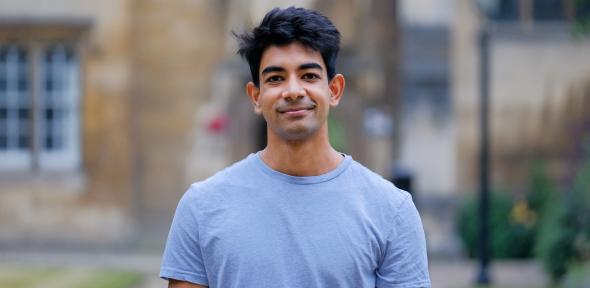
Nilesh, from India, is a PhD candidate at Christ’s College. Based in the Department of Pharmacology, his research focuses on a new cancer gene therapy
I applied to Cambridge after speaking to a supervisor here – to make sure I would be able to do the project I wanted to do - and because of the funding that was available. The University’s reputation is huge, and comes from the great researchers, past and present. But, for me, it was about making sure the support was going to be there to carry out my work.
I had always planned to take postgraduate study – it seemed the most obvious way forward after I finished my degree in Biomedical Science at Imperial College London. And I’d already come up with the programme I wanted to work on. That was my focus and that’s what I wanted to continue with.
My college was very helpful when I was applying to come here, particularly the tutorial office, and I was given all the information I needed at the right time. I filled out a form for my accommodation and they did everything else for me; they sent me pictures of all the places available for me to choose from. The admissions team were also helpful and replied to my questions quickly.
When you apply to a course you automatically get considered for most of the scholarships available at Cambridge. I was accepted for the Harding Distinguished Postgraduate scholarship, it covers my tuition fees, and my college fees, which include accommodation and food, and a personal research allowance for conferences and such. There are also college-specific bursaries available - for those you have to apply directly to your college.
My research is inspired by the insolvability of certain problems and the need to help all living things! I want to have a positive impact on daily life and on society. Throughout school, from the very beginning, I found the sciences and maths way more interesting than other subjects. When I reached high school, I just found diseases and the treatment of diseases so interesting that I decided that was the way I was going to go. At the time I couldn’t decide between medicine and biomedical science. I chose biomedical science because you can still do medicine afterwards. That’s how it started.
The focus of my PhD is the development of an original cancer gene therapy, which I came up with during my undergraduate studies. The labs at Cambridge are a very collaborative environment, and everyone wants each other to succeed. I’ve also had great support from my supervisor, who takes the time to teach me and give advice. During the pandemic I’ve felt safe – the departments have been very organised and have introduced a lot of safety measures, such as the hand sanitisers and masks, and different ways of working.
There are lots of opportunities to connect with industry, lots of networking events to help you get to know what others are doing, and a lot of support to help you move forward in your career. You read about this cool world and then it comes to life when you get here!
The Christ’s community is very friendly, and if you have a problem there is someone to help you. You get to spend time with students and college Fellows regularly. There are special events to help postgraduates get to know people, and it’s great to see other perspectives outside of your department bubble. There are lots of things to love about Cambridge. I spend time in the gym and hang out with friends from the department. There’s plenty of space, and it’s also very convenient for connections and travel. London is very close, and Stansted Airport is also nearby if you want to fly somewhere.
My advice to anyone thinking of applying is to go for it. You can see the history the alumni, these great people, have left behind, and it’s amazing to live and work in the same place, but you shouldn’t let that reputation scare you – you don’t need to compare yourself to other people. Those types of concerns disappear as soon as you get here.
